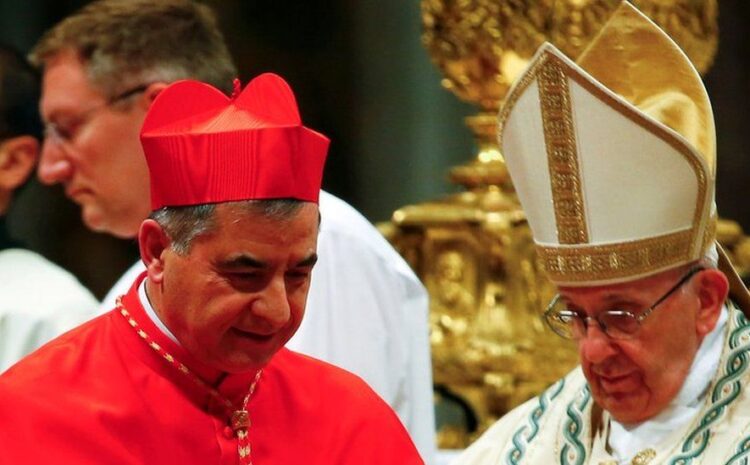
IMAGE COPYRIGHT REUTERS image caption Cardinal Giovanni Angelo Becciu (L) had been a close adviser to Pope Francis
Cardinal Angelo Becciu, 73, is the most senior cleric in modern times to face trial for alleged financial crimes.
He is charged with spending €350m (£299m; $412m) of church money on a botched deal to buy a property in Chelsea that incurred huge losses.
He denies wrongdoing.
Cardinal Becciu was sacked by the Pope in September, as reports of financial misdeeds emerged.
A two-year investigation exposed how the Vatican lost millions of euros, including donations from worshippers, after buying a former Harrods warehouse in Sloane Avenue, Chelsea, in 2014. The cardinal was formerly in charge of donations at the secretariat which handles Vatican funds.
Nine other defendants are also accused of crimes including extortion, embezzlement, money-laundering and abuse of office.
The special courtroom is in the Vatican Museums – not the usual courtroom, as more space was required because of Covid rules and the numbers attending.
- Swiss lawyer René Brülhart, who previously headed the Vatican’s financial regulation body, the former Financial Information Authority, and his ex-deputy Tomasso di Ruzza
- Monsignor Mauro Carlino, who was Cardinal Becciu’s private secretary
- Enrico Crasso, a former Vatican investment manager
- Cecilia Marogna, accused of buying luxury goods with funds authorised by the cardinal for Vatican intelligence work, including efforts to free clergy held hostage in various countries.
The defendants deny wrongdoing. If found guilty, they could face jail terms or fines, or both.
Prosecutors allege that a London-based broker, Gianluigi Torzi, defrauded the Vatican while using its money to buy shares in the Chelsea building, which was to be converted into luxury apartments. Mr Torzi calls the allegations a misunderstanding.
The Vatican’s new finance chief, Juan Antonio Guerrero, says it is now being more transparent about its affairs.
Last week, the Vatican published details of its holdings, including more than 4,000 properties in Italy and 1,120 in other European cities.
